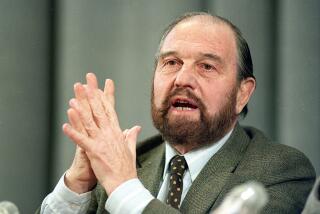Charles Hostler dies at 94; OSS agent who worked with French resistance
- Share via
For his World War II service as an intelligence officer in Nazi-occupied France, Charles Hostler received a Legion of Merit award from the U.S. and a French Legion of Honor.
He also got something else: a scar on his forehead from the butt of a meat ax wielded by a French collaborator who was resisting Hostler’s entreaties to switch sides and aid the Allies.
Hostler’s attacker later relented and, along with others, helped funnel disinformation to convince Hitler that the D-Day invasion had only been a feint and a greater invasion was planned elsewhere on the coast. The false information helped pin down battalions of German troops as the Allies fought toward Paris and Berlin.
In the decades after the war Hostler’s scar faded but his appreciation of how his life had been shaped by his work with the Office of Strategic Services – forerunner to the Central Intelligence Agency – grew larger.
“Looking back, there were two major influences on my life: the Great Depression and OSS,” Hostler once said. “The Depression gave me perspective and humility. The OSS taught me how to survive and helped me excel.”
Hostler excelled in several fields: as a colonel in the U.S. Air Force, a top executive with the McDonnell Douglas Corp., ambassador to the island nation of Bahrain in the Persian Gulf, private-sector investor, and adjunct professor of political science at San Diego State University.
Hostler, who lived in Coronado, died Sept. 28 of cardiac arrest at a Navy hospital in San Diego, his family said. He was 94.
“Charles Hostler was a visionary and a true American hero,” said San Diego State President Elliot Hirshman.
Charles Warren Hostler was born in Chicago on Dec. 12, 1919. Like many Americans, the family was financially devastated by the 1929 stock market crash. The Hostlers moved to California and Charles helped the family by selling newspapers on the streets of San Francisco.
He attended UCLA, joining the Reserve Officer Training Corps to help pay his college expenses. After graduation in 1942, Hostler went on active duty.
His fluency in French made him a natural for the OSS, which assigned him to help the French resistance and root out collaborators. He landed on Utah Beach on D-Day, armed with a pistol, a spy camera, a list of suspected collaborators, and, in hopes of persuading French women to provide information, several pairs of stockings and tubes of lipstick.
For decades the work of Hostler and other OSS operatives was classified. But once the veil of secrecy was lifted, one of Hostler’s proudest moments was recalling a comment by President Eisenhower that the OSS had saved thousands of lives by hastening the end of the war.
After the liberation of Paris, Hostler was assigned to Romania, where the government switched sides and joined the Allies. Among his chores was smuggling pro-democracy leaders out of Romania to protect them from the communists.
After World War II, as the Cold War ratcheted up tensions between the U.S. and Soviet Union and both sides jockeyed for influence, Hostler helped train the air intelligence unit of the Turkish military and also served as U.S. military attache in Lebanon, Jordan and Cyprus.
He retired from the Air Force as a colonel and worked for McDonnell Douglas, a major defense contractor, in Beirut, Paris, Cairo and California. He served in the administrations of Presidents Nixon and Ford, assigned to promote international business.
He received a master’s and doctorate in political science from Georgetown University and a master’s in Middle Eastern studies from American University in Beirut. A political supporter of President George H.W. Bush, he served as ambassador to Bahrain from 1989 to 1993.
After Bahrain, Hostler joined San Diego State. He helped bring noted speakers to its Institute on World Affairs, now named in his honor.
Hostler and his wife, Chinyeh Rose, established a fellowship at San Diego State and supported the campus veterans center. In February, the campus dedicated Charles Hostler Hall in recognition of the couple’s $3 million gift to support international studies.
In 2004 he published his autobiography, “Soldier to Ambassador: From the D-Day Normandy Landing to the Persian Gulf War.” His other books were “Turkism and the Soviets” and “The Turks of Central Asia.”
Hostler is survived by his wife.
Twitter: LATsandiego
More to Read
Start your day right
Sign up for Essential California for the L.A. Times biggest news, features and recommendations in your inbox six days a week.
You may occasionally receive promotional content from the Los Angeles Times.





